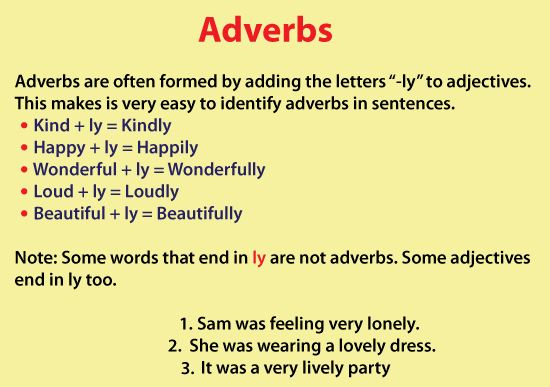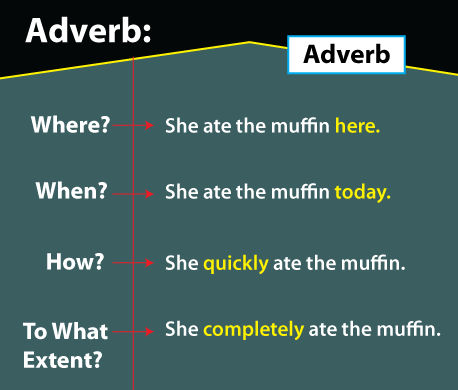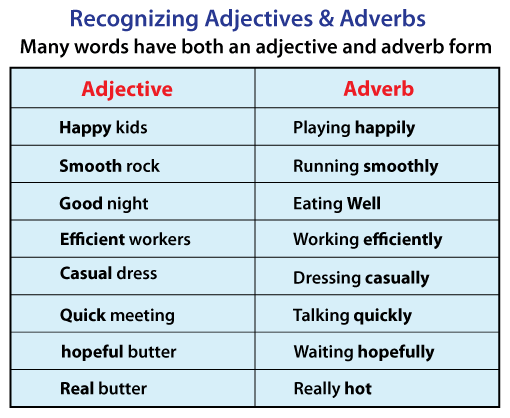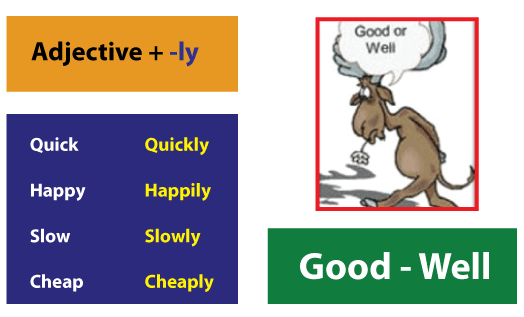Adverb Of HappyIntroductionAdverbs are important parts of speech that we utilize to add information and spice up our sentences. Victoria strolled, for example, is a nice sentence but a touch uninteresting. However, an adverb can be used to liven things up, as, in the statement, Victoria moved beautifully. If Victoria is a little careless, we could say she strolled strangely. We can add some tension by saying Jessica walked cautiously. Finally, by suggesting Victoria stepped undersea, we can travel beneath the waves. (Aren't adverbs wonderful?) 
Adverbs were utilized to change verbs in all of our example sentences. Adverbs, on the other hand, can do so much more! What is an Adverb?Verbs, adjectives, other adverbs, determiners, clauses, prepositions, or statement is modified by the adverb. Adverbs often describe manner, location, timing, frequency, degree, level of certainties, and so on, answering queries such as how? when? where? and to what extent? Hence adverb is a term from one of the important form classes in any language, generally serving as a modifier of the verbs, adjectives, another adverb, prepositions, phrases, clauses, sentences, conveying some connection of manner or quality, place, time, degree, number, cause, opposition, affirmation, or denial, and in English Grammar also serving to communicate and exhibit comment on clause content. Adverbs are words that alter verbs, adjectives, clauses, and other adverbs. The term gently is an adverb that changes the verb built in the statement Robert gently created a castle. Many adverbs end in -ly and are typically found adjacent to the term they modify. 
Adverbs are a type of word that, like adjectives, adds detail to a sentence or clause by altering (describing) another term. Adverbs, unlike nouns, come from prior verbs. They are terms that alter verbs and adjectives extensively; thus, they are positioned before them rather than after them. Adverb Of HappyThe term in the query is in the type of an adjective. 'Happy' is often employed as an adjective. The definition of 'happy' is 'feeling or showing joy or satisfaction.' Happy is an adjective, and we must change it to an adverb. So, to turn an adjective into an adverb, simply add the relevant suffixes. These suffixes can vary from a basic '-ly' to none at all. Verbs, adjectives, other adverbs, determiner, clauses, prepositions, or statement is altered by the adverbs. Adverbs are used to indicate things such as manners, places, timings, frequency, degree, level of certainties, and so on. 
We now understand how to change nouns into adjectives. Let's have a look at the possibilities for the adverb of happy that are present. : (a)happyly - This word is created by appending the suffix 'ly' to the supplied word without transforming the preceding 'y' to an I. This word is grammatically wrong. This is not the adverb type of the word 'happy.' This is not the necessary response. As a result, this is an erroneous option and not adverb of happy (b)happier - This term is created by prefixing the provided term with the suffix 'ier.'The word is correct for usage but This term is grammatically wrong in terms of adverb. This is not the adverb of 'happy.' This is not the required response. As a result, this is an erroneous option. (c)happily - This word is derived by prefixing the supplied word with the suffix 'ly.' This is a proper grammatical word. This is the adverb version of "'happy.' This is the correct response. As a result, this is the proper option or the adverb of happy (d)happilily - This term is created by prefixing the provided word with the suffix' lily.' This word is grammatically wrong. This is not the adverb version of "'happy.' This is not the necessary response. As a result, this is an erroneous option and not the adverb of happy Take note: Try to identify the suitable suffix for the given the word. Then, transform the given adjective term into the required part of speech, attempting to discover the appropriate suffix. Check that it is grammatically correct. Then select the appropriate choice. 
Happily, is an adverb of happy
The term "happy" is used to describe a person. It is a pronoun that expresses the term "she." "Was" is a copulative verb, which indicates that it expresses equivalence. As a result, the statement says, "Helen = happy." If the statement were "Helen moved fast," then the term "fast" would be an adverb since "fast" specifies a verb-how Helen moved. To determine if a term is an adjective or an adverb, consider what it describes: an object (then it is an adjective) or an act (then it is an adverb). Below are a few instances of the word Happily, which is the adverb of Happy (Adjective)
Next TopicAdverb Sentences
|
 For Videos Join Our Youtube Channel: Join Now
For Videos Join Our Youtube Channel: Join Now
Feedback
- Send your Feedback to [email protected]
Help Others, Please Share










